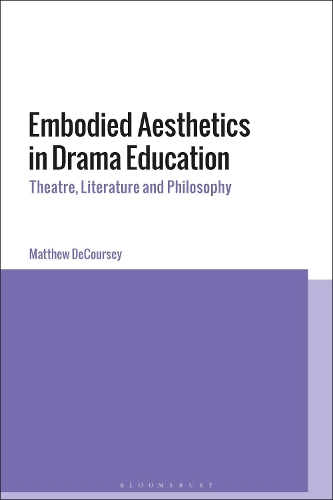
Embodied Aesthetics in Drama Education: Theatre, Literature and Philosophy
(Hardback)
Publishing Details
Embodied Aesthetics in Drama Education: Theatre, Literature and Philosophy
By (Author) Dr Matthew DeCoursey
Bloomsbury Publishing PLC
Bloomsbury Academic
13th December 2018
United Kingdom
Classifications
Tertiary Education
Non Fiction
Educational: Drama and performance arts
792.071
Physical Properties
Hardback
216
Width 156mm, Height 234mm
446g
Description
If it is a good thing to use drama for education, there must be something specific about drama that makes it good for the purpose. It has power of some kind: it makes things meaningful that would otherwise be meaningless, or things memorable that would otherwise be forgettable. Or perhaps it enables independent thought in an area that would otherwise become mere rote learning. Many practitioners believe that drama has the power to develop learner autonomy, or even to give learners power over their lives. In the last twenty years, a widespread view has developed that this something that creates the benefit of drama is aesthetics. There are many views of aesthetics, but what unites them is the special significance that art has for our lives. This book is about the relation between aesthetics and education in the use of drama. Within it, philosophy appears as the essential connecting discipline between the practice of arts-based education and our advancing knowledge of the interrelations of cognition, emotion, and embodiment. Matthew DeCoursey argues that the power of dramatic art is to be found in its bodily, emotional nature. Drawing on recent work in the aesthetics of theatre, he shows that much of the power of theatre can be attributed to a specific range of ideas and techniques, notably including double meaning-making, aesthetic focus and dramatic tension. Finally, the author relates different forms of drama education to different educational results, holding that the conventional improvised forms are neither superior nor inferior to scripted theatre, but merely serve different purposes. Among those educational results discussed are the emancipation sought both by Rancire and by many practitioners of applied theatre, but also curricular areas, including language education.
Reviews
In this richly textured and engaging book, Matthew DeCoursey provides a compelling defense of the use of drama techniques in education broadly construed. Drawing upon his own experience as a teacher of drama, he brings the tradition of theoretical reflection on the socially and individually transformative value of drama education into fruitful dialogue with contemporary philosophical and scientific thinking about the essentially embodied and affective dimensions of learning and cognition. * David Davies, Professor of Philosophy, McGill University, Canada *
Matthew DeCoursey has done us all a great service with this book. Its impressive philosophical sweep provides researchers and practitioners in the field of drama and arts education with a much needed text - clearly written, neatly argued and comprehensive in its scope. Making connections between aesthetic theory, educational philosophy, neuroscience and applied theatre practice, it will help readers better understand the nature of the aesthetic in their own teaching and learning and in that of key influential practitioners. * Joe Winston, Professorial Fellow in Drama and Theatre Education, University of Warwick, UK *
Matthew DeCoursey treats and makes available an enormous range of materials from a number of different academic disciplines. This is a book for scholars and postgraduate level students; those who engage with this book will profit significantly from encountering and contending with its central claims and the arguments for them. * James R. Hamilton, Professor of Philosophy, Kansas State University, USA *
A welcome addition to the expanding literature confirming educational process dramas place in the aesthetic tradition, as art as well as pedagogy. In doing so it usefully focuses attention both on recent neurological discoveries in understanding art, and on dramas emancipatory characteristic of "building the significance of possibility". * John O' Toole, Chair of Arts Education, University of Melbourne, Australia *
Author Bio
Matthew DeCoursey is Assistant Professor at the Education University of Hong Kong, Hong Kong, where he teaches drama, literature and French through drama. He has directed twelve plays in Turkey, Bulgaria and Hong Kong, and was co-playwright of Mongkok Dancer. Recent publications include articles in Research in Drama Education and The Journal of Aesthetic Education.
